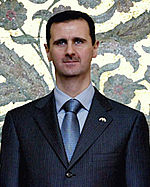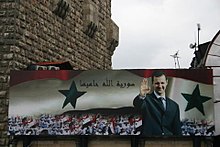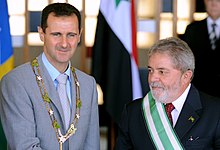This is an old revision of this page, as edited by RavenFeat (talk | contribs) at 22:33, 10 February 2011 (→Presidency). The present address (URL) is a permanent link to this revision, which may differ significantly from the current revision.
Revision as of 22:33, 10 February 2011 by RavenFeat (talk | contribs) (→Presidency)(diff) ← Previous revision | Latest revision (diff) | Newer revision → (diff)| Bashar al-Assad بشار الأسد | |
|---|---|
 | |
| President of Syria | |
| Incumbent | |
| Assumed office 17 July 2000 | |
| Prime Minister | Muhammad Mustafa Mero Muhammad Naji al-Otari |
| Vice President | Farouk al-Sharaa Najah al-Attar |
| Preceded by | Abdul Halim Khaddam (interim) |
| Personal details | |
| Born | (1965-09-11) 11 September 1965 (age 59) Damascus, Syria |
| Political party | ASBP |
| Spouse | Asma Assad |
| Occupation | Ophthalmologist , Politician |
Bashar al-Assad (Template:Lang-ar, Baššār al-Asad; born 11 September 1965) is the President of the Syrian Arab Republic, Regional Secretary of the Ba'ath Party, and the son of former President Hafez al-Assad. Al-Assad is a controversial figure both in Syria and Internationally. He has been criticized for his disregard for human rights, economic lapses, sponsorship of terrorism, and corruption. Al-Assad is an outspoken critic of the United States and Israel.
Biography

Bashar al-Assad was born in Damascus, on 11 September 1965. Initially Bashar had few political aspirations. Hafez al-Assad had been grooming Bashar's older brother, Basil al-Assad, to be the future president. Bashar studied ophthalmology at Damascus University 1988 and arrived in London in 1992 to continue his studies. He was recalled in 1994 to join the Syrian army after Basil's death in an automobile accident. Bashar entered the military academy at Homs, north of Damascus, following the death of Basil, and was propelled through the ranks to become a colonel in January 1999. The accident made Bashar his father's new heir apparent. When the elder Assad died in 2000, Bashar was appointed leader of the Baath-Party and the Army and was elected president unopposed with what the regime claimed to be a massive popular support (97.2% of the votes), after the Majlis Al Sha'ab (Parliament) swiftly voted to lower the minimum age for candidates from 40 to 34 (Assad's age when he was elected). On 27 May 2007 Bashar was approved president for another seven-year term, with the official result of 97.6% of the votes in a referendum without another candidate. Assad stands about 189 cm (6 ft 2 in). He speaks English fluently and also speaks casual conversational French, having studied at the Franco-Arab al-Hurriyah school in Damascus, before going on to medical school at the University of Damascus Faculty of Medicine. He completed his ophthalmology residency training in Tishreen Military Hospital of Damascus and subsequently went on to receive subspecialty training in ophthalmology at the Western Eye Hospital in London. He could not finish his formal training due to the unexpected death of his brother. Bashar was a staff colonel in the Syrian military.
In December 2000, Assad married Asma Assad, née Akhras, a Syrian Sunni Muslim from Acton (west London) whom he met in the United Kingdom, where she was born and raised. On 3 December 2001, they became the parents of their first-born child, named Hafez after his late grandfather. Zein was born on 5 November 2003, and Karim on 16 December 2004.
Presidency
The Ba'ath Party remains in control of the parliament, and is constitutionally the "leading party" of the state. Until he became president, Bashar al-Assad was not greatly involved in politics; his only public role was head of the Syrian Computer Society, which introduced the Internet to Syria in 2001. Al-Assad was confirmed as president by an unopposed referendum in 2001. He was expected to take a more liberal approach than his father. In an interview he stated that he saw democracy in Syria as 'a tool to a better life' but then argued that it would take time for democracy to come about and that it could not be rushed. Politically and economically, Syrian life has changed only slightly since 2000. Immediately after he took office a reform movement made cautious advances during the Damascus Spring, which led al-Assad to shut down Mezzeh prison and release hundreds of political prisoners. However, security crackdowns commenced again within the year.

In an interview with ABC News he stated: "We don't have such political prisoners," yet the New York Times reported the arrest of 30 political prisoners in Syria in December 2007.
Economic liberalization in Syria has been limited with industry still heavily state-controlled. However some changes have occurred including the introduction of private banking and the encouragement of foreign involvement, most notably in the oil sector. The need for a diversification of the economy has been pressed for by some as it has been predicted that Syria will change from exporting to having to import oil by 2015. The reliance upon oil is reflected by manufacturing exports representing only 3.1 per cent of Syria’s GDP. These issues are especially relevant as Syria’s population is predicted to more than double to over 34 million by 2050. There have been mild economic sanctions (the Syria Accountability Act) applied by the United States which further complicate the situation. Of major importance are the negotiations for a free trade association agreement with the European Union.
Al-Assad has failed to drastically modernize or liberalize the public sector. According to Acram al-Bouni, a Syrian journalist, he has used the reliance of a vast amount of the population, al-Bouni estimates 50%, upon employment by the state as a means to maintain power. With a large number of people on the state payroll it is less likely resistance movements will form as income from their employment is, “the only thing they have . . . They fear change.”
Despite gaining re-election in 2007, al-Assad’s position was considered by some to have been weakened by the withdrawal of Syrian troops from Lebanon following the "Cedar Revolution" in 2005. There has also been pressure from the US concerning claims that Syria is linked to terrorist networks, exacerbated by Syrian condemnation of the assassination of Imad Mughniyeh, Hezbollah military leader, in Damascus in 2008. Interior Minister Bassam Abdul-Majeed stated that, "Syria, which condemns this cowardly terrorist act, expresses condolences to the martyr family and to the Lebanese people.”
Assad still holds a vast amount of power within Syria and no significant political changes seem forthcoming in the immediate future.
Foreign relations

The United States, European Union, the March 14 Alliance, Israel, and France accuse Assad of logistically supporting militant groups aimed at Israel and any opposing member to his government. These include most political parties other than Hezbollah, Hamas, and Islamic Jihad.Assad claimed the United States could benefit from the Syrian experience in fighting organizations like the Muslim Brotherhood at the Hama Massacre.
Assad opposed the 2003 invasion of Iraq despite a long-standing animosity between the Syrian and Iraqi governments. Assad used Syria's seat in one of rotating positions on the United Nations Security Council to try to prevent the invasion of Iraq. Following the Iraq invasion by coalition forces, Assad was accused of supporting the Iraqi insurgency. A US general accused him of providing funding, logistics, and training to Iraqi and foreign Muslims to launch attacks against U.S. and coalition forces in Iraq.
The assassination of former Lebanese Prime Minister Rafik Hariri and the accusation of Syrian involvement, and support for anti-Israeli groups, helped precipitate a crisis in relations with the United States.

However, during the Pope John Paul II's funeral in 2005 Assad shook hands with the Israeli president Moshe Katsav.
Assad was criticized for Syria's presence in Lebanon which ended in 2005, and the US put Syria under sanctions partly because of this. He threatened many members of the Lebanese parliament in order to enforce the illegal accession of the pro-Syrian General Émile Lahoud to the Lebanese presidency in 1998.
In the Arab world, Assad mended relations with the Palestine Liberation Organization but relations with many Arab states, in particular Saudi Arabia, have been deteriorating. This is in part due to Assad's continued intervention in Lebanon and his alliance with Iran. Around the time of the 2008 South Ossetia war, Assad made an official visit to Russia. In an interview with the Russian TV channel Vesti, he asserted that one cannot separate the events in the Caucasus from the US presence in Iraq, which he condemned as a direct threat to security."
After the 2005 assassination of Lebanese Prime Minister Rafik Hariri, many media outlets accused Syria of being involved. as Hariri was anti-Syrian. However, Assad argued that Syria's gradual withdrawal of troops from Lebanon, beginning in 2000, was precipitated as a result of the event.
In 2011, Assad described himself as "anti-Israel" and "anti-West" and told the Wall Street Journal that he was not in danger of being overthrown because of these policies.
Arab-Israeli conflict

In a speech about the 2006 Israel-Lebanon conflict in August 2006, Bashar al-Assad said that Hezbollah had "hoisted the banner of victory," hailing its actions as a "successful resistance." He claimed that Arab resistance was growing stronger, and warned Israel that "your warplanes, rockets, and your atomic bomb will not protect you in the future." He called Israel an "enemy," with whom no peace could be achieved as long as they and their allies (especially the U.S.) support the practice of preemptive war. In the same speech, he also called Arab leaders that have criticized Hezbollah "half-men."
In April 2008, Assad told a Qatari newspaper that Syria and Israel had been discussing a peace treaty for a year, with Turkey as a go-between. This was confirmed in May 2008, by a spokesman for Israeli Prime Minister Ehud Olmert. As well as a peace treaty, the future of the Golan Heights is being discussed. Assad was quoted in The Guardian as telling the Qatari paper:
- . . . there would be no direct negotiations with Israel until a new US president takes office. The US was the only party qualified to sponsor any direct talks, told the paper, but added that the Bush administration "does not have the vision or will for the peace process. It does not have anything."
According to leaked American cables, Bashar al Assad called Hamas an "uninvited guest" and said "If you want me to be effective and active, I have to have a relationship with all parties. Hamas is Muslim Brotherhood, but we have to deal with the reality of their presence.", comparing Hamas to the Syrian Muslim Brotherhood which was crushed by his father Hafez al Assad. He then claimed Hamas would disappear if peace was brought to the Middle East.
Assad has indicated that the peace treaty that he envisions would not be the same kind of peace treaty Israel has with Egypt where there is a legal border crossing and open trade. In an interview with Charlie Rose, Assad said “There is a big difference between talking about a peace treaty and peace. A peace treaty is like a permanent ceasefire. There’s no war, maybe you have an embassy, but you actually won’t have trade, you won’t have normal relations because people will not be sympathetic to this relation as long as they are sympathetic with the Palestinians: half a million who live in Syria and half a million in Lebanon and another few millions in other Arab countries.”
See also
References
- Syria's Assad: Regime strong because of my anti-Israel stance
- Beeston, Richard; Blanford, Nick (22 October 2005). "We are going to send him on a trip Bye bye Hariri Rot in hell". The Times. London. Retrieved 26 April 2010.
- "Transcript of Al assad". Transcripts.cnn.com. 2000-06-10. Retrieved 2010-08-03.
- "The road to Damascus (all the way from Acton)". BBC News. 31 October 2001. Retrieved 26 April 2010.
- "Syria factfile: Key figures". The Daily Telegraph. London. 24 February 2003. Retrieved 26 April 2010.
- ^ "Syrian President speaks about democracy in Syria". YouTube. Retrieved 2010-08-03.
- Cambanis, Thanassis (14 December 2007). "Challenged, Syria Extends Crackdown on Dissent". The New York Times. Retrieved 26 April 2010.
- "Syria's economy requires broader reforms to reach and sustain higher growth" (in Template:Fr icon). 1stjordan.net. Retrieved 2010-08-03.
{{cite web}}: CS1 maint: unrecognized language (link) - "meepas Syria country profile–Economic snapshot". Meepas.com. Retrieved 2010-08-03.
- "Syria - Population Reference Bureau". Prb.org. Retrieved 2010-08-03.
- Jonathon Gatehouse (2006-08-03). "Syria's next trick: a bargain for power | Macleans.ca - World - Global". Macleans.ca. Retrieved 2010-08-03.
- "Bomb kills top Hezbollah leader". BBC News. 13 February 2008. Retrieved 26 April 2010.
- "Assad sets conference conditions". BBC News. 1 October 2007. Retrieved 26 April 2010.
- "Assad claims United States could benefit from syrian counterterrorism techniques". Memri.org. Retrieved 2010-08-03.
- "Iraq war illegal, says Annan". BBC News. 16 September 2004. Retrieved 26 April 2010.
- Post Store (2004-12-17). "General: Iraqi Insurgents Directed From Syria". washingtonpost.com. Retrieved 2010-08-03.
- Rose, Charlie (2006-03-27). Charlie Rose (TV-Series). United States: WNET.
- Syria's Assad: Regime strong because of my anti-Israel stance
- "Lebanon: the war after the war". openDemocracy. 2006-10-11. Retrieved 2010-08-03.
- Walker, Peter (2008-05-21). "Olmert confirms peace talks with Syria". London: The Guardian. Retrieved 2008-05-21.
Israel and Syria are holding indirect peace talks, with Turkey acting as a mediator...
{{cite news}}: Unknown parameter|coauthors=ignored (|author=suggested) (help) - Roee Nahmias (Roee Nahmias). "Assad: Iran won't attack Israel with nukes". ynetnews.com. Retrieved December 12, 2010.
{{cite news}}: Check date values in:|date=(help) - Meris Lutz (December 02, 2010). "Syria's Assad seems to suggest backing for Hamas negotiable, leaked cables say". Los Angeles Times. Retrieved December 12, 2010.
{{cite news}}: Check date values in:|date=(help) - "March 27th, 2006 Interview". Retrieved February 5, 2011.
Further reading
- Bashar Al-Assad (Major World Leaders) by Susan Muaddi Darraj, (June 2005, Chelsea House Publications) ISBN 0-7910-8262-8 for young adults
- Syria Under Bashar Al-Asad: Modernisation and the Limits of Change by Volker Perthes, (2004, Oxford University Press) ISBN 0-19-856750-2 (Adelphi Papers #366)
- Bashar's First Year: From Ophthalmology to a National Vision (Research Memorandum) by Yossi Baidatz, (2001, Washington Institute for Near East Policy) ISBN B0006RVLNM
- Syria: Revolution From Above by Raymond Hinnebusch (Routledge; 1st edition, August 2002) ISBN 0-415-28568-2
- Bashar al-Assad and John F. Kennedy, Forward Magazine (Syria) Article Author :Scott C. Davis (2008-05-18). "Bashar al-Assad and John F. Kennedy | Forward Magazine". Fw-magazine.com. Retrieved 2010-08-03.
{{cite web}}:|author=has generic name (help) - Assad: We too were not very happy with Annapolis, Forward Magazine (Syria) "Assad: We too were not very happy with Annapolis | Forward Magazine". Fw-magazine.com. 1967-06-04. Retrieved 2010-08-03.
- Seven years of Bashar al-Assad’s rule 2000-2007, Forward Magazine (Syria)
External links
- بشار الأسد
- President Al-Assad CV
- The Assad Dynasty in Syria: From Father to Son
- Profile on the Encyclopedia of the Orient
- Interview of Bashar al-Assad on Charlie Rose - PBS (March 28, 2006)
- Bashar al-Assad's Lebanon Gamble
- Mideast Just Peace
- Assad on the Brink
- CFR mini-profile of Bashar al-Assad
- President Al-Assad Pictures
- Open Letter to Bashar Assad
- Connecting the dots in Lebanon
- Assad's Website
- Unofficial site for Bashar Al-Assad
- President Al-Assad Speeches in English
| Political offices |
|---|
| Presidents of Syria (list) | |
|---|---|
| Syrian Federation (1922–1924) | |
| State of Syria (1925–1930) | |
| First Syrian Republic (1930–1950) | |
| Second Syrian Republic (1950–1958) | |
| United Arab Republic (1958–1961) | |
| Second Syrian Republic (1961–1963) | |
| Ba'athist Syria (1963–2024) | |
| * acting | |


